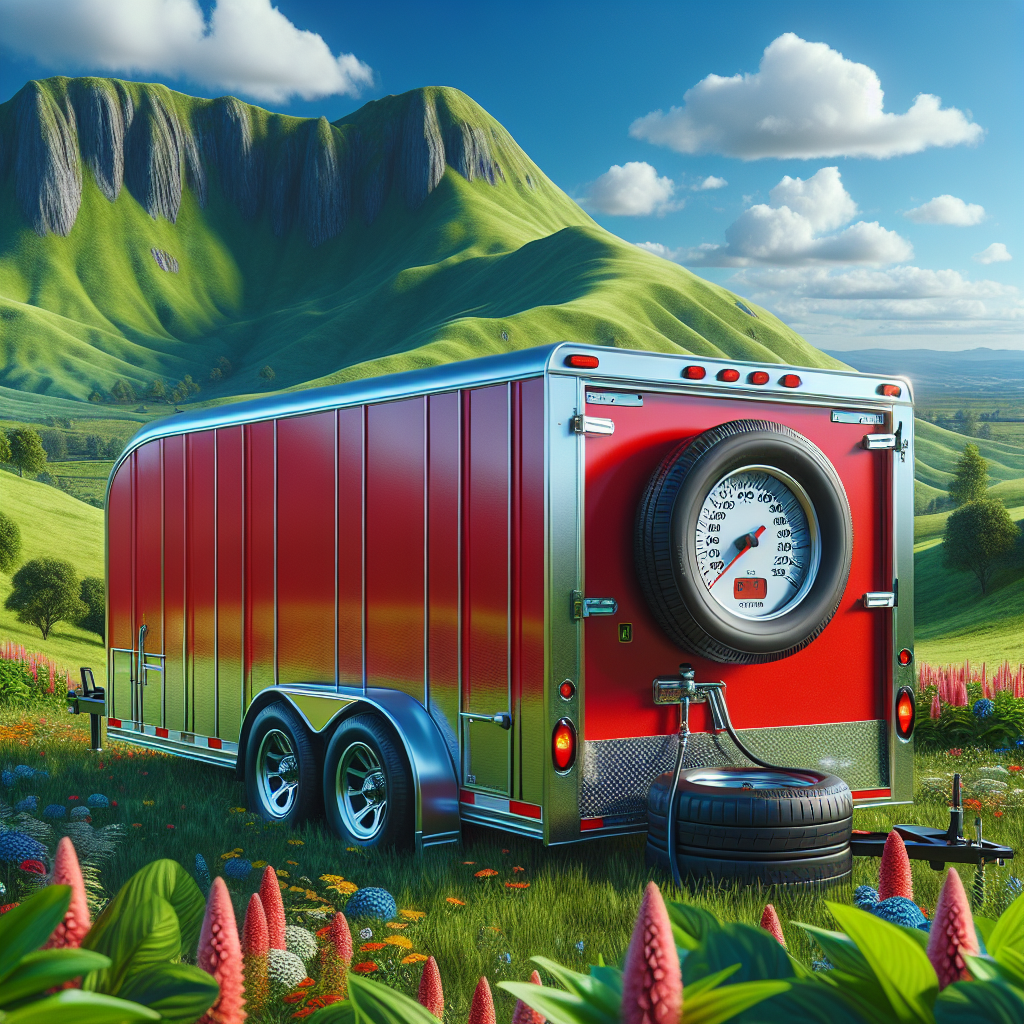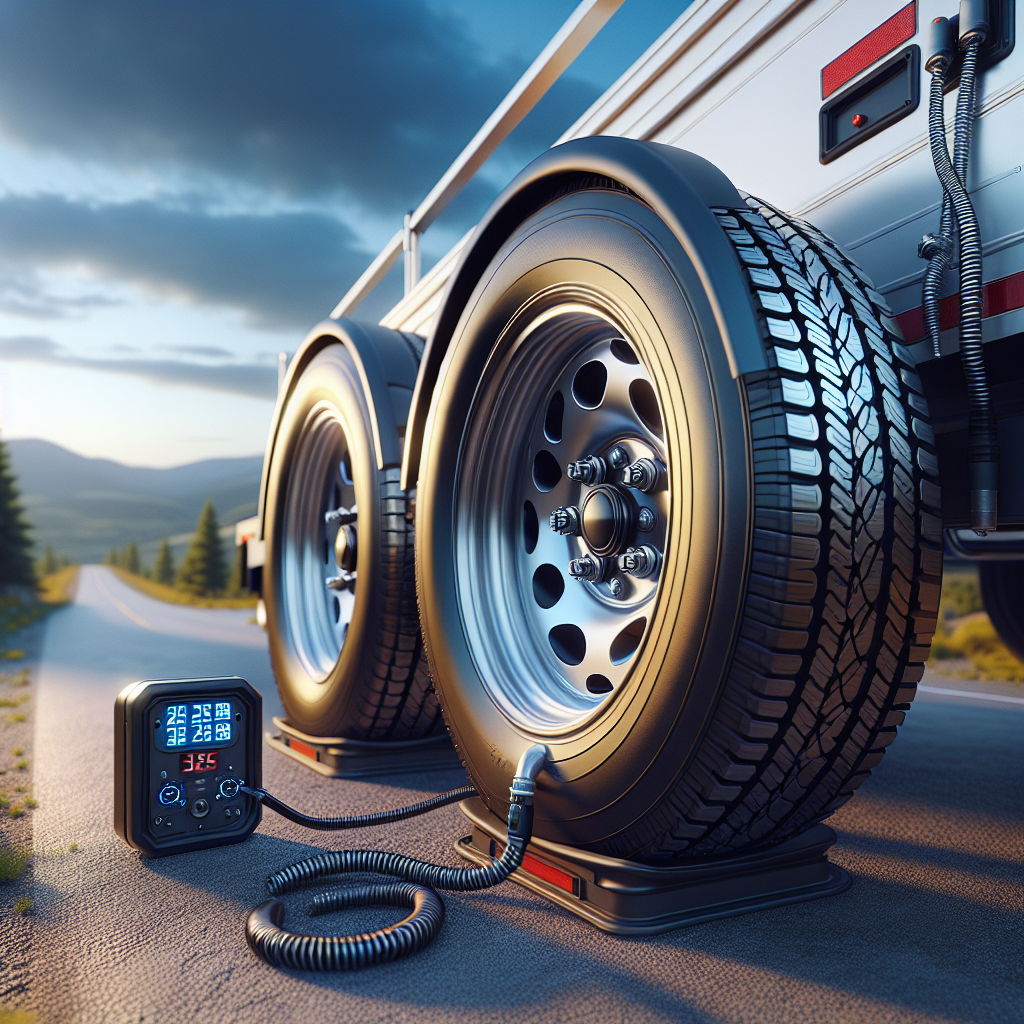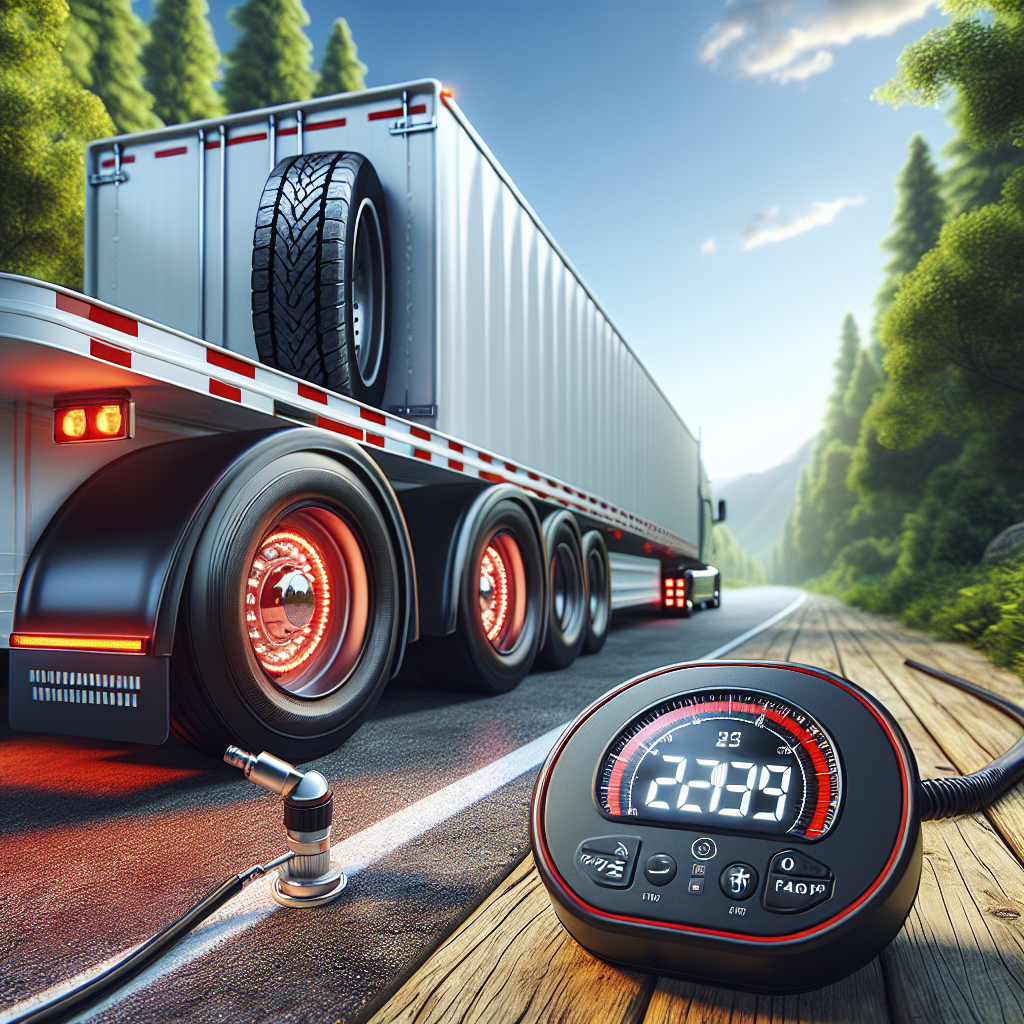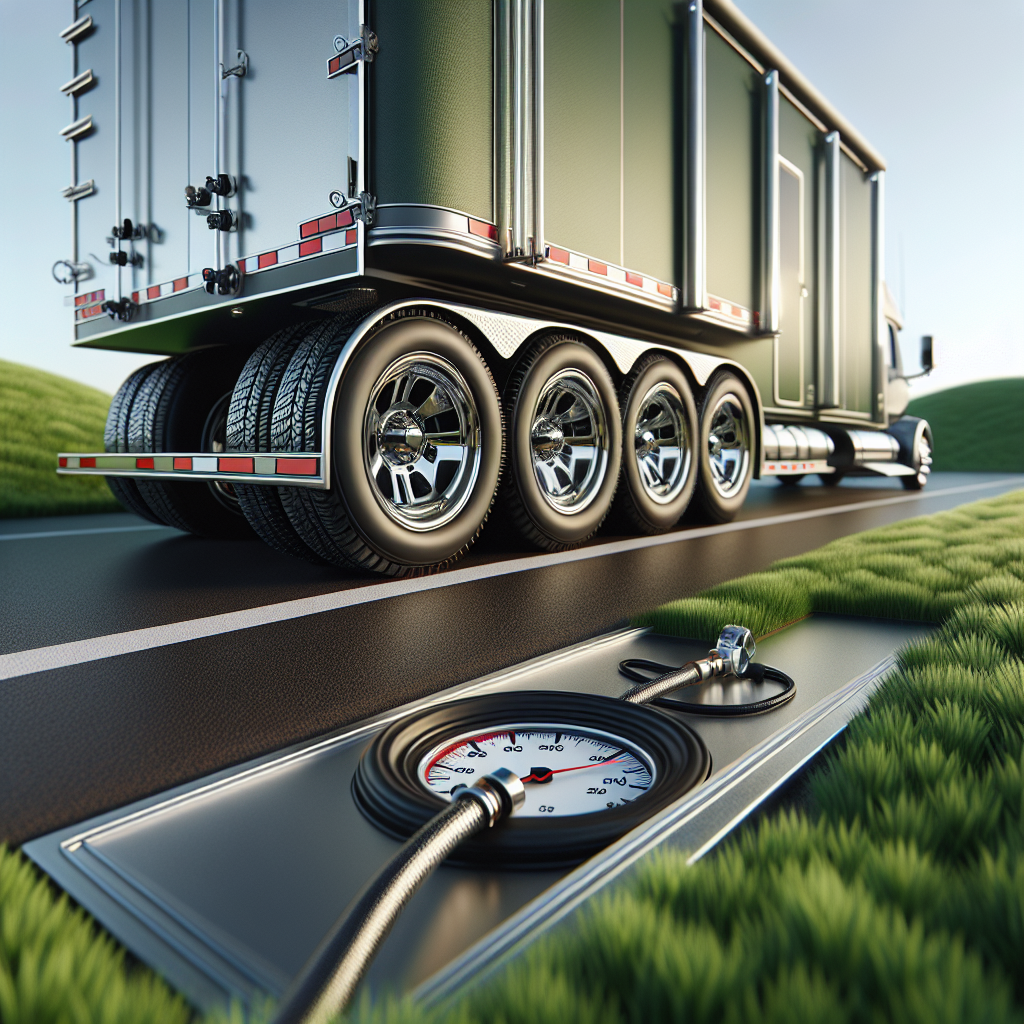Maintaining optimal tire pressure is crucial for the safety and efficiency of any trailer. A trailer tire pressure system plays a vital role in monitoring the air pressure of each tire, ensuring they are adequately inflated for safe towing. Under-inflated tires can lead to poor handling, increased tire wear, and even catastrophic blowouts, presenting significant risks for both the cargo and the vehicle.
One of the primary functions of a tire pressure system is to provide real-time data, allowing drivers to react promptly to any pressure fluctuations. Regular monitoring can prevent dangerous situations, as tires that are consistently inflated within the recommended range can improve fuel efficiency and enhance overall performance. Furthermore, maintaining the right tire pressure helps in:
- Improving Traction: Properly inflated tires ensure better grip on the road, especially in adverse weather conditions.
- Extending Tire Life: Consistent pressure helps reduce wear and tear, which can ultimately save money on replacements.
- Enhancing Safety: A well-maintained tire pressure system minimizes the risk of accidents caused by tire failure.
For these reasons, it is essential to recognize that trailer tire pressure system service is required to keep your trailer operating safely. Regular checks and maintenance can make all the difference in preventing failures and ensuring a smooth journey.
Tow with peace of mind, knowing that trailerwatchdog is standing guard.
Key Benefits of Maintaining Tire Pressure Systems

Maintaining tire pressure systems offers numerous advantages that significantly impact the performance and safety of trailers. Understanding these benefits can motivate trailer owners to prioritize regular monitoring and maintenance of their tire pressure systems.
Some key benefits include:
- Enhanced Fuel Efficiency: Properly inflated tires reduce rolling resistance, leading to improved fuel consumption. This not only saves money but also reduces the environmental impact.
- Increased Safety: Regular monitoring of tire pressure minimizes the risk of blowouts and accidents caused by under-inflation. Ensuring that tires maintain the correct pressure significantly enhances road safety for both the driver and others on the road.
- Better Handling and Stability: Correct tire pressure contributes to improved handling and stability, making it easier to navigate turns and maintain control, especially in challenging road conditions.
- Longer Tire Life: Consistent pressure helps prevent uneven wear and tear on tires, extending their lifespan and reducing the frequency of replacements.
- Reduced Maintenance Costs: By regularly maintaining tire pressure, owners can avoid costly repairs and replacements associated with tire failure, which can disrupt operations and lead to unexpected expenses.
In summary, maintaining tire pressure systems is not just about adhering to safety standards; it is a proactive approach to ensuring the longevity and efficiency of trailers. As such, regular checks and services should be a standard practice for all trailer owners.
Signs Your Trailer Needs Tire Pressure Service

Identifying when your trailer requires tire pressure service is crucial for maintaining safety and performance. Recognizing the signs early can prevent catastrophic failures and ensure a smoother towing experience. Here are some common indicators that your trailer may need immediate tire pressure service:
- Frequent Tire Pressure Alerts: If your tire pressure monitoring system (TPMS) frequently indicates low pressure, it's time to inspect your tires. Constant alerts signal potential leaks or other issues that need addressing.
- Uneven Tire Wear: Check for signs of uneven wear patterns on your tires. This can indicate improper inflation, which can lead to decreased handling and stability.
- Visible Damage: Look for any visible signs of damage on your tires, such as cracks, bulges, or punctures. These issues can significantly impact the integrity of the tire and may require immediate service.
- Flat Tires: A flat tire is an obvious sign that something is wrong. If you find yourself needing to inflate your tires frequently, or if you experience a flat, seek professional assistance to assess the problem.
- Poor Handling: If you notice your trailer pulling to one side or experiencing difficulty in maneuvering, it may be due to uneven tire pressure. This can compromise safety and requires immediate attention.
Being proactive about these signs can save you from costly repairs and enhance your trailer's performance. Regular inspections and timely services are essential for keeping your trailer safe and road-ready.
Steps to Ensure Proper Tire Pressure Maintenance

Maintaining proper tire pressure is essential for the safety and efficiency of your trailer. Following a structured maintenance routine can help you catch issues early and extend the lifespan of your tires. Here are some effective steps to ensure proper tire pressure maintenance:
- Check Tire Pressure Regularly: Use a reliable tire pressure gauge to check the pressure at least once a month and before any long trips. Refer to the manufacturer’s recommended pressure, typically found on a sticker inside the trailer door or in the owner's manual.
- Inspect Tires for Damage: Regularly examine your tires for any visible signs of wear, such as cracks, bulges, or foreign objects embedded in the tread. Address any damage immediately to prevent further complications.
- Rotate Tires: Just like vehicle tires, trailer tires benefit from rotation. This helps ensure even wear, which can prolong the life of your tires. Aim to rotate them every 5,000 to 8,000 miles or as needed.
- Monitor Load Weight: Always adhere to the weight limits specified for your trailer. Overloading can increase tire pressure and lead to blowouts. Distribute weight evenly to maintain balance and prevent uneven wear.
- Utilize a Tire Pressure Monitoring System (TPMS): Invest in a TPMS to provide real-time monitoring of tire pressure. This advanced technology alerts you to any significant changes in pressure, allowing for quicker responses to potential issues.
By implementing these steps, you can significantly reduce the likelihood of tire-related problems and enhance the overall safety of your trailer on the road.
How to Choose the Right Tire Pressure Monitoring System
Selecting the right Tire Pressure Monitoring System (TPMS) for your trailer is crucial in ensuring safety and performance. With various options available, it’s important to consider several factors to make an informed decision. Here’s a guide to help you choose the best TPMS for your needs:
- Compatibility: Ensure that the TPMS you choose is compatible with your trailer’s tire size and configuration. Some systems are designed for specific types of trailers, while others can accommodate a wide range of vehicles.
- Ease of Installation: Look for a TPMS that offers straightforward installation. Many modern systems come with user-friendly instructions and can be installed without professional help. Wireless options are particularly convenient.
- Real-Time Monitoring: Opt for a system that provides real-time data on tire pressure and temperature. This feature is essential for immediate alerts when abnormalities occur, allowing for quick action to prevent failures.
- Durability: The TPMS should be built to withstand harsh conditions, including extreme temperatures and road vibrations. Choose a system made from high-quality materials to ensure longevity.
- Alerts and Notifications: Look for systems that offer customizable alerts. Some TPMS devices can send notifications directly to your smartphone, ensuring you are always informed, even when you’re away from your trailer.
- Battery Life: Consider the battery life of the sensors. Systems with long-lasting batteries reduce the frequency of replacements, making maintenance easier.
By carefully evaluating these factors, you can select a TPMS that not only enhances your trailer’s safety but also provides peace of mind while on the road.
Preventing Catastrophic Failures with Proper Service

Ensuring the safety and reliability of your trailer is paramount, and one of the most effective ways to achieve this is through proper service of your trailer tire pressure system. Regular maintenance can significantly reduce the risk of catastrophic failures, which can lead to dangerous situations on the road. Here are some essential service practices to consider:
- Routine Inspections: Conduct regular checks on your tire pressure and temperature monitoring system. Look for signs of wear or damage, and ensure that all sensors are functioning correctly.
- Calibration: Ensure that your TPMS is calibrated according to your trailer’s specifications. This helps in providing accurate readings and alerts, which are vital for timely interventions.
- Tire Maintenance: Regularly inspect tires for proper inflation, tread wear, and alignment. Proper tire maintenance enhances the performance of your TPMS and prolongs the life of your tires.
- Software Updates: If your TPMS has software components, keep them updated. Manufacturers often release updates that improve system performance and fix bugs.
- Professional Servicing: Consider having your trailer serviced by professionals, especially if you notice any irregularities. They can provide deeper diagnostics and ensure that every component of your TPMS is working optimally.
By committing to these service practices, you can significantly mitigate the risks associated with tire and axle failures. Tow with peace of mind, knowing that trailerwatchdog is standing guard. Visit trailerwatchdog.com to learn more about our advanced monitoring systems that keep your trailer safe on the road.








